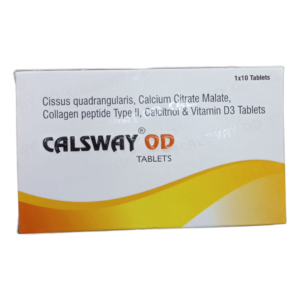CALCITRIOL + VITAMIN D3 (CHOLECALCIFEROL) + CALCIUM CITRATE MALATE + CISSUS QUADRANGULARIS (HADJOD) + COLLAGEN TYPE-2
Calcitriol: Calcitriol is a drug that belongs to a group of medications known as vitamin D analogues. It is used to treat conditions caused by low levels of vitamin D or calcium in the body, such as hypocalcemia (low blood calcium levels) and hypoparathyroidism (underactive parathyroid glands).
The primary mechanism of action of Calcitriol is to enhance the absorption of calcium and phosphate from the intestine. This leads to an increase in calcium levels in the blood and helps to maintain proper bone health and mineral balance in the body.
The dose of Calcitriol depends on the condition being treated and the individual patient’s needs. It is typically prescribed as a capsule and is taken by mouth once or twice daily. The dosage should be determined by a healthcare professional based on the specific needs of the patient.
Like any medication, Calcitriol may cause certain side effects. Some common side effects of Calcitriol include nausea, vomiting, headache, dizziness, loss of appetite, constipation, and stomach pain. These side effects usually go away on their own as the body adjusts to the medication. However, if any of these side effects persist or worsen, it is important to inform a healthcare provider.
In rare cases, Calcitriol may cause more severe side effects such as high levels of calcium in the blood (hypercalcemia), which can lead to symptoms like increased thirst, frequent urination, confusion, and weakness. It is important to seek medical attention if any of these symptoms occur.
It is also worth noting that Calcitriol may interact with certain medications, so it is important to inform the prescribing healthcare provider about all other medications being taken before starting treatment with Calcitriol. Pregnant or breastfeeding women should also consult with a healthcare professional before taking Calcitriol, as its safety during pregnancy and lactation is not well-established.
This information is not exhaustive, and it is important to consult with a healthcare professional or read the medication’s package insert for complete and accurate information about Calcitriol, including its potential risks and benefits.
Vitamin D3 (cholecalciferol): Vitamin D3, also known as cholecalciferol, is a fat-soluble nutrient that plays a crucial role in maintaining bone health and regulating calcium and phosphorus levels in the body. It is primarily used as a dietary supplement to treat or prevent vitamin D deficiency.
The main mechanism of action of vitamin D3 is its conversion into its active form, calcitriol, in the body. Calcitriol acts as a hormone and binds to vitamin D receptors in various tissues, including the intestines, bones, and kidneys. It stimulates the absorption of calcium from the intestines, promotes calcium reabsorption in the kidneys, and helps regulate the release of calcium from bones.
The recommended dose of vitamin D3 varies based on age, sex, and specific health conditions. For adults, a common dose range is 600 to 2000 international units (IU) per day. However, higher doses may be prescribed to correct severe deficiencies.
Common side effects of vitamin D3 supplements are usually mild and include nausea, vomiting, constipation, and loss of appetite. High doses of vitamin D3 over an extended period can lead to vitamin D toxicity, resulting in symptoms such as excessive thirst, frequent urination, extreme fatigue, and kidney problems. It is essential to consult a healthcare professional to determine the appropriate dosage and to monitor for any potential adverse effects, especially in individuals with underlying health conditions or those taking other medications.
Calcium Citrate Malate: Calcium Citrate Malate is a dietary supplement that is used to increase calcium levels in the body. It is known for its high bioavailability, meaning that the body can easily absorb and utilize the calcium it provides.
The primary mechanism of action of Calcium Citrate Malate is to provide the body with a readily available source of calcium. Calcium is an essential mineral that plays a crucial role in many bodily functions, including maintaining strong bones and teeth, muscle contraction, nerve transmission, and blood clotting. By supplementing with Calcium Citrate Malate, individuals can ensure that their calcium levels are adequate for these important functions.
The recommended dose of Calcium Citrate Malate can vary depending on factors such as age, sex, and the specific health condition being treated. Typical doses range from 250 mg to 500 mg per day, taken orally in divided doses with meals. It is important to follow the instructions provided by the healthcare professional or the product label.
While Calcium Citrate Malate is generally considered safe and well-tolerated, some potential side effects may occur. Common side effects include constipation, bloating, gas, and stomach upset. Drinking plenty of water and incorporating fiber in the diet can help reduce these digestive issues. Rarely, some individuals may experience allergic reactions, such as rash, itching, or swelling.
It is important to note that excessive intake of Calcium Citrate Malate can lead to hypercalcemia, a condition characterized by high levels of calcium in the blood. This can cause various symptoms, including kidney stones, fatigue, nausea, and impaired kidney function. It is advisable to consult a healthcare professional before starting or adjusting the dose of Calcium Citrate Malate to ensure safe and appropriate usage.
Overall, Calcium Citrate Malate is a commonly used supplement for maintaining adequate calcium levels in the body. It is generally safe when used as directed, but it is always important to seek medical advice if any concerns or side effects arise.
Cissus Quadrangularis (hadjod): Cissus quadrangularis, commonly known as hadjod, is a medicinal plant that is native to South Asia. It has been used for centuries in traditional Ayurvedic medicine for its various health benefits.
Uses:
Cissus quadrangularis is primarily used for its bone healing properties. It is commonly prescribed to aid in the healing of fractures, bone injuries, and osteoporosis. It is also used to manage joint pain and inflammation associated with conditions like arthritis. Additionally, Cissus quadrangularis has been studied for its potential benefits in weight loss, diabetes management, and as an anti-inflammatory agent.
Mechanism of Action:
The exact mechanism of action of Cissus quadrangularis is not fully understood. However, it is believed to work by promoting bone formation and improving bone strength through its effects on osteoblasts, which are the cells responsible for bone formation. It also exhibits anti-inflammatory and analgesic properties, which may contribute to its effectiveness in managing joint pain and inflammation.
Dose:
The recommended dosage of Cissus quadrangularis extract may vary depending on the specific formulation and the intended use. However, commonly recommended doses range from 500 mg to 1500 mg per day. It is important to follow the dosage instructions provided by a healthcare professional or the product label.
Side Effects:
Cissus quadrangularis is generally considered safe when used as directed. However, some mild side effects have been reported, including nausea, stomach upset, and headache. In rare cases, it may cause allergic reactions in individuals who are sensitive to the plant. As with any medication or supplement, it is recommended to consult with a healthcare professional before starting Cissus quadrangularis to ensure it is safe and appropriate for your individual health needs.
Collagen Type-2: Collagen Type-2 is a dietary supplement that contains collagen extracted from the cartilage of chickens. It is commonly used for joint health and is often marketed as a treatment for osteoarthritis.
The mechanism of action of Collagen Type-2 is thought to involve stimulating the production of collagen and other proteins that are important for joint health. It is believed that supplementing with collagen may help to rebuild damaged cartilage and reduce pain and inflammation in the joints.
The recommended dose of Collagen Type-2 varies depending on the specific product and brand. However, a common dose is typically around 2 grams per day, either in divided doses or as a single dose.
Collagen Type-2 is generally considered safe for most people when taken in the recommended doses. However, there have been reports of some minor side effects, including digestive issues such as stomach upset, diarrhea, and constipation. Some individuals may also experience allergic reactions to collagen supplements.
It’s important to note that while Collagen Type-2 may provide some benefits for joint health, it is not a cure for conditions like osteoarthritis. It is always advisable to consult with a healthcare professional before starting any new supplement regimen, especially if you have any underlying health conditions or are taking other medications.


